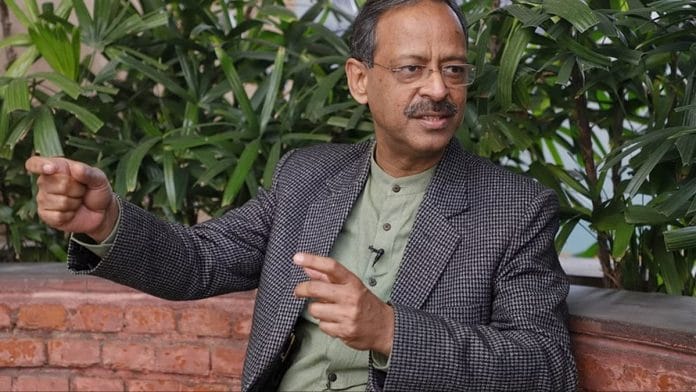New Delhi: Prime Minister Narendra Modi’s close aide A.K. Sharma ‘persuaded’ then coal secretary Anil Swarup for a “dispensation to an industrialist” who was supposedly seeking what Swarup understood to be an “illegal” favour, the former IAS officer discloses in his book Encounters with Politicians, released on 20 January. Swarup writes that he did not “oblige” and was subsequently shifted out of the coal ministry.
Sharma, a former Gujarat-cadre Indian Administrative Service (IAS) officer who joined the PMO as joint secretary in 2014, is currently minister for urban development & energy in the Yogi Adityanath-led government in Uttar Pradesh. He took voluntary retirement in 2021 and was appointed UP BJP vice-president before he joined the state government in 2022.
Swarup was Union coal secretary from October 2014 to November 2016, after which he was shifted to the school education and literacy department.
Talking about Sharma in his book, Swarup writes: “Matters were pretty smooth till it came to a dispensation to an industrialist who was seeking a favour, which I understood to be illegal. He (Sharma) relentlessly persuaded me but not once was he impolite.”
“His persuasive skills were such that even the principal secretary to the PM, who was known to be an extremely upright officer and who knew I would never do anything that I thought was wrong, started pushing me to take a decision in favour of the industrialist,” he states. At the time, Nripendra Misra — also considered close to Modi — was principal secretary to the prime minister. Misra was later appointed chairperson of the construction committee under the Shri Ram Janmabhoomi Teerth Kshetra Trust.
“Anyway, I did not oblige. I was shifted out of the coal ministry,” Swarup adds.
ThePrint reached Nripendra Misra and A.K. Sharma for comment but had not received a response by the time of publication. This report will be updated if and when a response is received.
In another chapter in the book, on Union minister Piyush Goyal, Swarup elaborates the demands of few “privileged power producers” who he says wanted to make a “fast buck”. These power generating companies placed bids for tariffs and were supposed to arrange coal themselves but Coal India Limited (CIL) was obliged to supply coal at a notified price — below the market price — to such companies with whom they had a prior agreement.
“There was no obligation to supply coal at a notified price to these ‘privileged’ few. These ‘privileged’ power producers had succeeded in getting a special dispensation for themselves during the UPA regime when there was an acute coal shortage,” writes Swarup.
Swarup adds that by 2016 coal production had increased substantially. The government at the Centre had changed and Piyush Goyal was the minister in charge. He writes that he was certain that Goyal was also under pressure to supply coal to these ‘privileged’ power producers, however “to his credit that he never put pressure on me to do so”.
“The pressure came directly to me from the Prime Minister’s Office (PMO). In almost every meeting convened by the PMO, whether relating to coal or otherwise, I was asked if I had linkages to these ‘privileged’ industrialists,” Swarup writes.
During his tenure as coal secretary between 2014 and 2016, Swarup alleges that the Union petroleum minister at the time created problems in his home state Odisha, for his ministry.
At a time when the ministry was looking to increase production, Odisha contributed a huge amount of coal. That too at a lower cost. Saying that “local issues” prevented optimal utilisation of coal, Swarup writes, “The real problems in the region were created by the Union Petroleum minister Dharmendra Pradhan. He apparently had an axe to grind in the local politics, as he hailed from Odisha and had ambitions for the top post in the state.”
Encounters with Politicians is Swarup’s third book, narrating his time and experiences with politicians that he met or worked with. These include four prime ministers, five presidents, 28 chief ministers and many ministers. Swarup, a 1981 batch IAS officer, is widely credited for facilitating transparent coal auctions following the alleged coal scam in the UPA era.
(Edited by Amrtansh Arora)
Also Read: ‘Government must be open to ideas’—Former IAS officer’s book has lessons for new India






